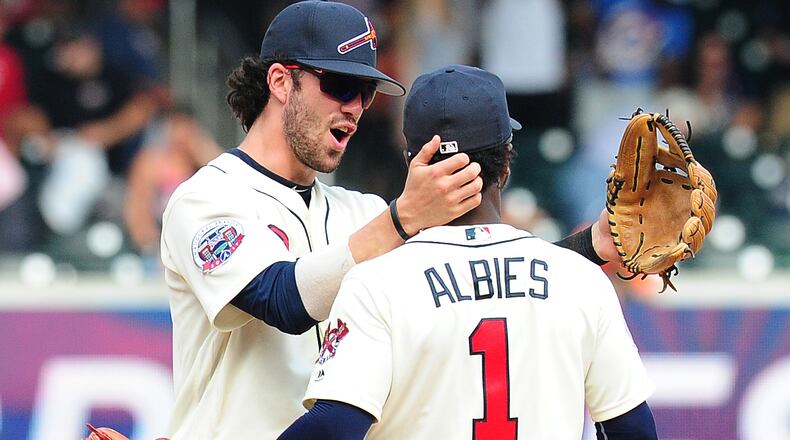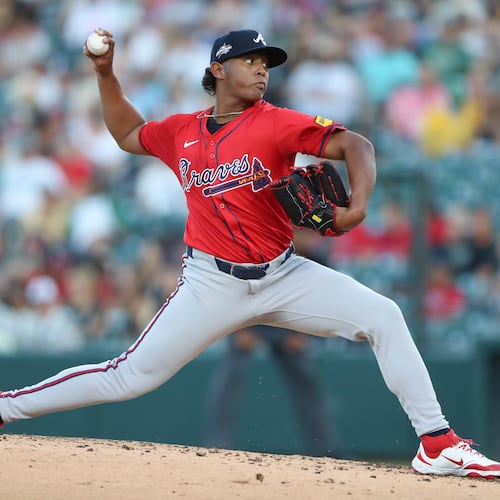Spring training starts Wednesday and arrives with good news and bad news for those Braves fans who’ve tired of the rebuilding project and long to compete again for a postseason berth.
The good news: The Braves have baseball’s deepest farm system and many of their top minor leaguers will be at spring training, including outfield phenom Ronald Acuna, a five-tool bundle of fast-twitch muscles who is the sport’s consensus No. 1 prospect.
With so much young talent already in the majors or arriving this spring, these Braves should be exciting and the rebuild’s finish line now seems relatively close.
The bad news: “Relatively close” is not 2018.
There will be quotes next week spring from Braves pitchers and catchers – they report Tuesday, and their first workout is Wednesday – and from early arriving position players and manager Brian Snitker about how they’re aiming for the National League East title. How there’s no reason they can’t surprise people and win at least a wild-card berth. How they should aim for nothing less.
But in truth, the Braves haven’t made the kind of offseason moves to expect dramatic improvement over last year’s 72-90 record.
The team has obvious major attributes, including one of baseball’s premier hitters in Freddie Freeman; a veteran catching tandem that was among baseball’s best in 2017; a Gold Glove center fielder and solid leadoff man in Ender Inciarte, and more.
The Braves also have multiple pitching prospects who could provide a needed boost to the starting rotation, including power-armed Luiz Gohara, who displayed vast potential in September, and lefty Max Fried, who could be used out of the bullpen initially (the Braves can’t fit all their young starters into the rotation, and the 2017 bullpen was shaky).
As for Acuna, he will compete for a spot on the opening-day roster and should be up before May, even if the Braves keep him in Triple-A a few weeks to assure an extra (seventh) season of control before free agency. He’s that good.
While he could make an immediate impact in the outfield and at the plate, it’s not fair or reasonable to expect 20-year-old Acuna’s power and overall offensive potential to manifest in his first season in the big leagues. This much is certain: With Acuna in the outfield instead of Matt Kemp, team defense would be markedly improved.
Some already name Acuna, Gohara and Fried among (very) early top candidates for National League Rookie of the Year, and watching them and other young Braves develop on the big stage should be exciting this spring and throughout the season for Braves fans. And so will watching second baseman Ozzies Albies and shortstop Dansby Swanson work together in Albies’ first full season in the majors after a wholly impressive two-month late-season stint.
Still, the offseason moves by the Braves weren’t the type that could reasonably be expected to turn a 90-loss team into a division contender overnight, and prospects can’t overshadow big question marks about this team, including its lack of power and a pitching staff that will rely on so much unproven talent and veterans rebounding from injuries or subpar seasons.
The Braves ranked 28th in the majors in home runs, ahead of only the Pirates and the Giants, and two of their top four home-run hitters are gone in Matt Kemp and non-tendered free agent Matt Adams, who had 19 homers apiece for the Braves to rank behind Freeman (28 homers in 117 games).
Kemp and Adams tied for second-most homers on the team with catcher Kurt Suzuki, who set a career high with 19 at age 33 in only 309 plate appearances while sharing duties with primary catcher Tyler Flowers. Adams (.543) and Suzuki (.536) were second and third on the team in slugging percentage behind Freeman (.586), and only six major league teams had a lower slugging percentage than the Braves (.412)
First-year Braves general manager Alex Anthopoulos, after being hired away from the Dodgers in November to replace disgraced GM John Coppolella, said right away he wouldn’t come in and start doing anything “crazy” like trading away a bunch of prospects stockpiled during the rebuild. He first wanted to see -- and have his staff see -- what the Braves had in the system before making assessments, rather than go off judgments of a previous regime or outsiders.
Anthopoulos would’ve considered sending prospects to the Marlins in a possible trade for standout outfielder Christian Yelich, a former Gold Glove and Silver Slugger award winner entering his prime and with five years of contractual control on a team-friendly contract. But when the payroll-dumping Marlins wouldn’t back off a demand for Acuna, the Braves moved on. They weren’t about to part with Acuna. Yelich went to the Brewers.
The Braves remain interested in young Marlins catcher J.T. Realmuto, but the asking price has been deemed excessive by the Braves and other suitors.
Even if the Braves hadn’t spent the early offseason dealing with the Coppolella situation and waiting for penalties -- they were hit with sanctions right before Thanksgiving and stripped of 13 prospects for infractions in international free agency; Coppolella was banned for life by MLB – the 2018 season still wouldn’t have been a go-for-it year signalling the rebuild was over and contending time was here again. That was at least a year away regardless.
Once Anthopoulos came aboard, he wanted to get the ship in order for a planned big push a year from now, when the Braves will have significantly more funds available – perhaps around $50 million -- for free agents or other high-salaried players acquired in trades. The first order of business in that regard was to dump the remaining two years of Kemp’s contract, which Anthopoulos did through a complicated and creative five-player trade with the Dodgers, a deal that allowed both franchises to get their financial pictures closer to where they wanted them.
The Braves had to take on some $30 million in additional payroll for 2018 to dump Kemp, but most of the added payroll was for players who’ll be in the final year of their contracts: first baseman Adrian Gonzalez, who was immediately released per agreement so that Gonzalez would waive his no-trade clause; and veteran pitchers Brandon McCarthy, whom the Braves have penciled into their starting rotation for 2018, and Scott Kazmir, who missed all of last season with injuries and isn’t being counted on to contribute, although the team hopes he’ll be able to.
Also coming to the Braves in the deal was utility infielder Charlie Culberson, a Georgia native who could be a valuable addition in 2018 and beyond.
The Braves ate up most of their available funds for this offseason with that trade, but cleared the decks for next year by getting rid of Kemp’s 2019 salary (he was owed more than $18 million from the Braves in each of the next two seasons). They didn’t expect to contend now and weren’t ready to raise the payroll to speed up the timetable. But they wanted to open a spot for Acuna while also getting their payroll situation set for next winter, when the Braves could be players at the big table in an offseason when the free-agent class will include the likes of star third basemen Manny Machado and Josh Donaldson.
A person close to the situation said the Braves did look this winter into signing free-agent outfielder Lorenzo Cain, a good hitter and strong defensive player who ended up signing with Milwaukee at the end of January for five years and $80 million. His deal included a full no-trade clause in the first year and limited no-trade protection for the rest of the contract; the Braves haven’t given no-trade clauses in the past and won’t under Anthopoulos.
Both Yelich and Cain are the type of players that the Braves under Anthopoulos will continue trying to add – good all-around hitters with power who also are strong defensive players. Improving the Braves’ defense – that would in turn help the young pitching staff -- is a top priority with the new GM, who also had interest in free-agent third baseman Todd Frazier before the New Jersey native signed last week with the Mets.
Though Frazier’s two-year, $17 million deal was well below what had been projected before the winter, there was a feeling that the power-hitting veteran would’ve required more money and perhaps an additional guaranteed year to sign with the Braves or someone else over a New York team, and the Braves’ 2018 budget likely would have forced them to offer a backloaded contract.
Neither a multi-year commitment or a backloaded deal was attractive to the Braves, since they didn’t want to block power-hitting third-base prospect Austin Riley, who could be ready at some point in 2019. Again, the 2018 season is so much about evaluation for the Braves, not just at the big-league level but with prospects such as Riley, catcher Alex Jackson and a handful of pitchers in the upper minor league ranks.
If Riley stalls or the Braves decide he isn’t the answer going forward, they want to be in position to pursue a long-term third baseman next winter.
Anthopoulos wants to give several young players a chance to play a lot this year, to show what they can do and help determine where they fit in the big picture. Versatile and defensively solid infielder Johan Camargo falls into that category. For now, Camargo is poised to compete with Rio Ruiz at third base, with Camargo appearing to be a favorite to win the job and have a chance to show what he can do as a lineup regular rather than in a utility role.
Things could still change at the last minute. With so many free agents still unsigned as spring training nears, there remains a possibility the Braves would make a move to add some power to the lineup. But with less than a week left before workouts begin in Florida, it looked more likely the Braves would wait and make such a move later in the season via trade or next winter through trade or free agency.
Of course the Braves hope to compete for a postseason berth this season. But this year is more about evaluating during the final stages of a long rebuild.
About the Author
Keep Reading
The Latest
Featured

